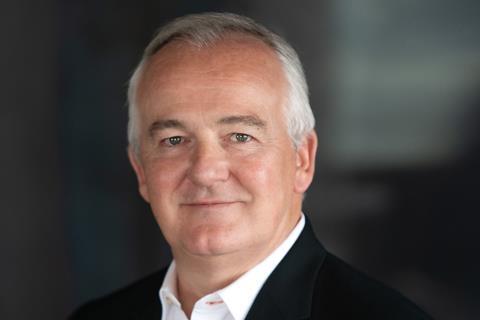
In the past several years, every major market has served as a litmus test for the health of the independent business in the wake of a profound event, and the European Film Market (EFM) will be no different as the industry gets back on its feet after the dual Hollywood strikes of 2023.
Top of mind for attendees will be how the independent market bounces back after nearly six months of actors and writers guild strikes, which required independent filmmakers to go through a complicated SAG-AFTRA interim agreement process to get their projects in front of the cameras (while studio and streamer projects involving guild members ground to a complete halt).
As a result of last year’s drastic production slowdown, North American distribution executives, and by extension their international partners, are bracing themselves for a thinner-than-usual US pipeline this year, particularly in the latter stages, due to reduced supply. The hope is that completed films with distribution and productions that wrap by April at the latest may slot into the summer schedule, which in turn presents opportunities for international partners on those films.
The aftermath of the production slowdown has intensified the eternal debate around availability of talent. According to some independent producers, a backlog in SAG‑AFTRA’s interim agreement approvals process may have cost them a potential golden opportunity to cast A-list actors while they were prohibited from working on studio and streamer projects.
Once the strike ended, talent returned to their streamer and studio commitments, or signed on to new ones in search of large paydays. That has made talent particularly hard to come by for the independent community.
Another talking point among US sellers is the viability and perception of EFM itself at a time when, they say, Berlin has lost some of the Hollywood lustre of yesteryear.
They will turn up, of course, but bemoan a relative lack of glamour without A-listers and studio heads on the red carpet supporting world premieres or special presentations, which can translate into market opportunities.
In the eyes of some, the arrival of incoming festival head Tricia Tuttle — the former BFI London Film Festival director who has deep Hollywood connections and replaces co-directors Carlo Chatrian and Mariette Rissenbeek on April 1 — cannot come soon enough.
Back to business

Regardless of who is in charge, the business does what it must. At time of writing, independent producers, financiers and their sales partners were deep into the usual scramble to pull packages together. January and early February are not easy months at the best of times to build sales slates and assemble packages after the holiday period, talent awards season commitments and the demands of Sundance Film Festival.
Yet WME Independent co-head Alex Walton for one has been feeling cautiously optimistic about the upcoming market.
“My expectation is that it’s going to be pretty busy in terms of the volume we see in Berlin — not Cannes volume, but a healthy amount of packages,” says Walton. “There are a number of packages currently in the financing process that should be confirmed in time to launch during EFM.”
The UK sales and financing veteran adds, “I feel the independent model is an increasingly viable option and we’ve just seen a healthy Sundance.”
Walton and his team closed one of the marquee deals in the Park City snow, selling Jesse Eisenberg’s comedy hit A Real Pain to Searchlight Pictures in a $10m worldwide deal that sparked a handful of other headline transactions. One of those was Neon’s swoop on worldwide rights to Presence, the Lucy Liu ghost story that marked Steven Soderbergh’s first return to Sundance as a director since his 1989 breakout sex, lies, and videotape.
Neon’s president of international sales and distribution Kristen Figeroid is expected to introduce Presence to buyers, who are typically looking to fill slots 12-24 months ahead but may well feel inclined to squeeze a quality title like Presence into their 2024 schedules, depending on when Neon dates the film in the US.
Figeroid was still reviewing scripts as well as projects with “real talent” attachments as she assembled the company’s market slate. She will be showing a promo of an unspecified film in post-production and anticipates a “pretty busy” time in Berlin.
“The big challenge right now is trying to work out talent schedules after months of their work time was cut out last year [by the Hollywood production shutdown], and they are committed to a lot of different things that might be a series, a studio film or an indie film,” notes Figeroid. “Slotting all of that into 2024 has been an obvious challenge.”
Another tricky area — echoed by most sales agents — is the mid-budget films in the $10m-$12m range, which might not make for obvious theatrical plays. “It’s either a lower-priced movie that you know you’re going to make your money back on, or you’re making those bigger bets on the theatrical movies,” says Figeroid. “But movies that are just down the middle of the road are becoming a challenge to pre-sell.”
Financier Joe Simpson of Ashland Hill Media Finance agrees, noting that in order to invest early in middle-ground packages, “There has to be something quite special about the project.”

Ashland Hill closed fewer deals during the strike, but Simpson and his business partners — who expect to have a number of projects through various sales agents in Berlin and are involved in the likes of Tornado at HanWay Films and The Magic Faraway Tree at Palisades Park Pictures — anticipate an active EFM.
“We’re seeing plenty of films going into Berlin, and we’re cautiously optimistic that it’s going to be a healthy market,” says Simpson. “AFM was quiet, Sundance had a few banner headlines sales but beyond that was relatively quiet. So while it might seem an inauspicious context for the market, what we have absolutely seen is for the right packages, the buyers are there.
“On the financing side of things,” Simpson continues, “we see more, larger, independent films [$40m-plus budget], and that the appetite is there for those when you have the elements.”
Rivulet Films president Rob Paris just shot Nutcrackers in Ohio over the holiday season. David Gordon Green directed and Ben Stiller stars in what Paris describes as an irreverent Christmas comedy with a big heart. “The next six months should offer a referendum on the impact of the strike — and how it was ultimately handled,” says Paris. “Starting with Berlin, how many undeniable packages survived the interim agreement gauntlet and made it to market?”
The producer and UTA Independent Film Group, which represents rights on Nutcrackers, will be in Berlin, and Paris is looking forward to the trip. “Berlin is more focused than Cannes,” the producer says. “It’s five days of intense meetings and you get work done. No-one goes there for the parties.”
On the subject of the strike impact, WME Independent’s Walton notes: “There are a number of films that have fallen out of Berlin due to the traffic jam caused by the strikes. Some projects we helped put together will have to wait and launch later in the year, for one reason or another. There was either not enough time to launch in Berlin or talent had multiple projects at the same time, causing schedules to be pushed back on certain projects. This bodes for a busy market in Cannes.”
European presence

Lorna Lee Torres will be in town as SVP of global sales at Magnify, the rebranded label formerly known as Magnolia Pictures International; it plans to invest at earlier stages in projects and will continue to sell Magnolia acquisitions as well as third-party films. Torres moved to Madrid, which gives her a foothold in Europe. This makes it easier for the team to access new talent while making stronger connections through covering more works-in-progress and co-production festivals and markets such as San Sebastian, EWIP Cologne, Busan, Ventana Sur and HAF at Filmart.
“In this competitive landscape, buyers are looking for original, distinct voices and stories while discovering new talents, which is what Magnify is focusing on,” says Torres, who will continue sales at EFM on the Austrian satire Veni Vidi Vici, which premiered at Sundance and screens in the market. Also screening are Venice selection Hesitation Wound, I Used To Be Funny, which Utopia is distributing in the US, and Mara’s Vacation.
“The success of [Argentinian crime comedy] The Delinquents in Cannes further accelerated our goals,” says Torres. “We are always about opportunity, and we’ll continue to be under the new label as we seek to board projects at earlier stages and of course completed films. But now, with me in Europe, the team is able to cover more here and also globally. It’s an exciting time for the company.”

















![[L-R]: Amanda Villavieja, Laia Casanovas, Yasmina Praderas](https://d1nslcd7m2225b.cloudfront.net/Pictures/274x183/6/4/1/1471641_pxl_20251224_103354743_618426_crop.jpg)







No comments yet